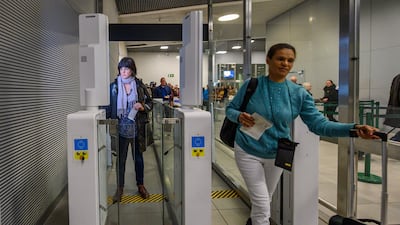The EU's harmonisation of Schengen visa rules for GCC citizens is likely to encourage more Gulf students, entrepreneurs and tourists to visit the continent, the EU's special representative to the Gulf region, Luigi di Maio, said on Monday.
Citizens of Saudi Arabia, Bahrain and Oman are now entitled to a five-year, multiple-entry visa to the Schengen area on their first request, instead of having to initially apply for shorter visas.
At the same time there has been a surge in UAE applicants to UK universities even as university leaders warned of an overall drop in international applications.
This EU process was granted last year to Kuwaiti and Qatari nationals. The UAE is not affected as it has a reciprocal visa-free system with the EU.
“It's an incentive to apply for a visa – it's a problem sometimes for entrepreneurs to ask many times for the same visa,” Mr di Maio said.
“It's very good for touristic flows and also a very good thing for researchers and students who want to come to Europe for their studies and internships.
“They were already welcome and are even more welcome,” he said.
The EU's decision to enable all GCC citizens to request a multiple-entry, five-year Schengen visa came into force earlier this month and was announced by EU Foreign Affairs Minister Josep Borrell on April 22 at the first high-level EU-GCC security forum.
The top 10 universities in the world for graduate employability - in pictures
The decisions to organise the forum and to introduce visa harmonisation are part of the follow-up to the EU's 2022 strategic partnership with the Gulf and a signal of warming relations.
“It is a significant step in strengthening people-to-people relations between the EU and the GCC,” Emily Tasinato, a researcher and analyst focused on politics and security in the Gulf region, told The National.
Schengen countries include all EU states except for Ireland, Cyprus, Bulgaria and Romania.
The National breaks down the new rules for you.
What has changed?

Multiple-entry visas allow the holder to spend 90 days at a time within the Schengen area over 180 days, as many times as required. For longer stays, visitors have to request long-term visas or residency permits.
Before this week's decision to harmonise rules, varying exemptions to the 2020 EU Visa Code were in force regarding GCC countries.
Under the EU Visa Code, travellers must first ask for a short-stay visa. Depending on their visa history, they may gradually be granted longer visas, starting at one year, then two years, up to a maximum of five years. This system is called a “cascade” visa regime.

Citizens of Saudi Arabia and Bahrain faced different procedures to those from Kuwait and Qatar. Omani citizens followed a third system.
From September, citizens of Qatar and Kuwait could directly request a five-year multiple entry visa. Before the change, they had to first ask for a one-year multiple entry visa, then a two-year visa, then a five-year visa.
Those rules also applied to Saudi and Bahraini nationals before the recent harmonisations in November 2022 and July 2023.
Omani citizens were immediately granted a two-year multiple entry visa on their first request, followed by a five-year visa.
An April 2022 request by the European Commission to grant Qataris and Kuwaitis visa-free access to Schengen was not approved by the European Parliament due to a corruption scandal allegedly involving lawmakers and Qatari and Moroccan officials.
The introduction of a general waiver for those two countries is not expected before a European election in June, said Mr Di Maio.
“We can speak about that after the formation of the new parliament and the formation of the new commission.”
What's the point?
Visa harmonisation represents more than just a “business dynamic”, said Mr Di Maio. It's a “political signal”, he said, responding to a question from The National. “Now all countries are synchronised at the maximum level of their access and validity of their visa.”
The decision to harmonise rules for GCC countries was based on an assessment by European consulates related to the “very specific context of the Gulf countries”, a commission official told The National.
This context includes “very low migratory and security risks associated with nationals of these countries” and a desire to harmonise rules for all GCC nationals, they said.
What are the financial requirements?
The visa fee is currently set at €80 ($86).
Visa-issuing authorities have to check that the applicant has sufficient means of subsistence, both for the duration of the intended stay and for the return to his country of origin or residence. This applies to all visa-required countries.












